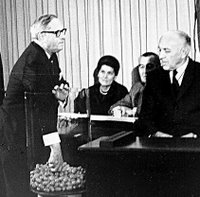Greetings

My memory of that period is incomplete, though I'd expect it to have the sharpness of a rifle report. I remember I was reading Sons and Lovers and brochures on conscientious objector status. I was also arguing with my father. My father thought I should try to be a non-combatant because CO status would hurt my future prospects. He also thought I woudn't do well in the service because of my habitual sarcasm. He was probably right. I just knew I didn't want anything to do with the war or the service.

Look closely at the photo. Two old white men are picking the numbers, selecting who is going to die. Thus was it ever.
And then Nixon abolished the draft. My memory of the lottery, the last decade or two, has been that I was in the last lottery. But I could never remember what my number had been. The selective service has a history of the lotteries. Turns out that I was never in one. They ended the year before.
I'm surprised. Perhaps I revised my memory because the threat of going to Southeast Asia was so overwhelming that I needed to have been closer to it in order to justify the feeling. I don't know. Memory is certainly narrative. What other memories have I revised to tell myself better tales of my mental landscape?





